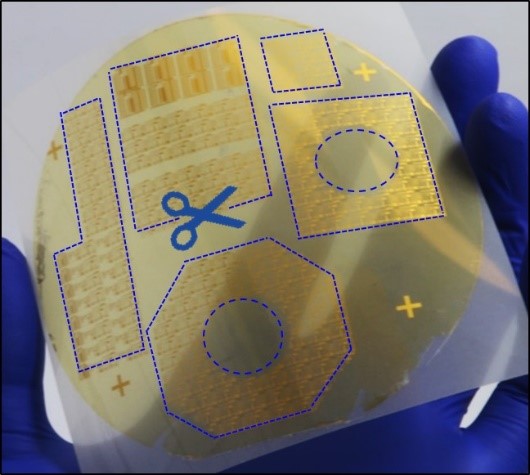BNC Virtual Faculty Seminar Series: Professor Chi Hwan Lee
Description

Sticker-Like Flexible Sensors for Wearable Healthcare Applications
Join Zoom Meeting: https://purdue-edu.zoom.us/j/93857631004
Abstract: The global market for wearable technology is anticipated to grow and reach $71.23 billion by 2021 according to the new market research report published by the Scalar Market Research. The most compelling version of wearable products demands prolonged contact to the human body enabling high-precision detection of biomechanical, biochemical, or/and electrophysiological signals associated with health and other conditions affecting wellbeing. In this field, the biggest challenge is that the rigid or semi-flexible form of microsystems and sensors do not interface well with the soft, irregular surface of the human body. This mechanical mismatch results in discomfort to users as well as low signal-to-noise ratios in the collection of data.
In the first part of this presentation, I will talk about my recent approaches to tackle this challenge by developing mechanically soft, deformable forms of microsystems and sensors. These approaches involve the use of advanced nanoengineering technologies that incorporate desired electronic functionalities directly into commercially-available garments or pads that are capable of unobtrusively interfacing to a specific body part. These innovative microsystems and sensors are designed for durability to be repeatedly attached and detached to/from the skin without irritating the wearer and damaging the devices. In addition, these devices are featured with patient-centered designs to meet critically important user requirements, including (1) breathability for user comfort, (2) conformability to the irregular surface of the skin, and (3) deformability against natural body movements.
In the second part of this presentation, I will introduce the recent development of next-generation eye-wearable microsensor platform. Despite significant progress, current state-of-the-art skin-wearable microsystems and sensors are primarily suited for larger body parts (e.g., the wrist, chest, and limbs), but not for the much smaller, softer, and exceptionally-sensitive human eyes. To address this unmet need, I develop new nanoengineering technology that enables turning commercially-available soft contact lenses into lifesaving tele-monitoring tools that can non-invasively, accurately, comfortably, and continuously diagnose the status of chronic ocular diseases, such as glaucoma. This approach is unique and innovative because it will be applicable to various materials and designs of soft contact lenses that offer excellent biocompatibility, softness, transparency, oxygen permeability, wettability, and are able to fit a variety of corneal shapes. This will eventually allow clinicians and researchers to better understand and intervene in several aspects of personal and population ocular health. I will present recent outcomes of comprehensive experimental, computational, and pre-clinical studies for several eye-wearable microsystems and sensors to discuss about the device reliability, batch production strategy, data acquisition methodology, and safety.
In summary, I will introduce recent research programs that make a significant paradigm shift from the current “skin-wearable” to “eye-wearable” biomedical devices using simple but effective microscale transducers. These research programs are novel and essential to the pursuit of advancing the field of microsystems and nanoengineering for their applications in wearable biomedical devices, pushing the disciplines forward, and bringing real impact to the society.
Bio: Chi Hwan Lee is an Assistant Professor of Biomedical Engineering and Mechanical Engineering, and by Courtesy of Materials Engineering, and Speech, Language, and Hearing Sciences at Purdue University. He is also an Adjunct Assistant Professor of Optometry at Indiana University. Dr. Lee is the founding member and chief technical officer of Curasis, LLC and Rescue Biomedical, LLC and founding member and scientific advisor of Omniply Tech by Tandem Launch, Inc. He completed his posdoc in materials engineering at the University of Illinois at Urbana-Champaign, recieved his PhD and MS in Mechanical Engieering from Stanford University and BS in Mechanical Engineering from Illinois Institute of Technology.
Contact Details
- Jaime Turner
- jjturner@purdue.edu
- 7654943509

